Leadership and Management in Operations Management: A Report
VerifiedAdded on 2021/01/02
|18
|6423
|210
Report
AI Summary
This report delves into the critical aspects of leadership and management within operations management, using Travelodge UK as a case study. It begins by defining the roles and characteristics of leaders and managers, differentiating between their responsibilities and influence. The report explores the practical application of leadership, including the roles of a leader, the five functions of management according to Fayol, and how leadership adapts to various situations like technological, economic, and political changes. It also examines Mintzberg's management roles and the key elements of an operational management system, including Total Quality Management (TQM). Furthermore, the report highlights the significance and impact of operation management and factors that influence business operations, providing a comprehensive overview of leadership and management in the context of operational efficiency and business success.
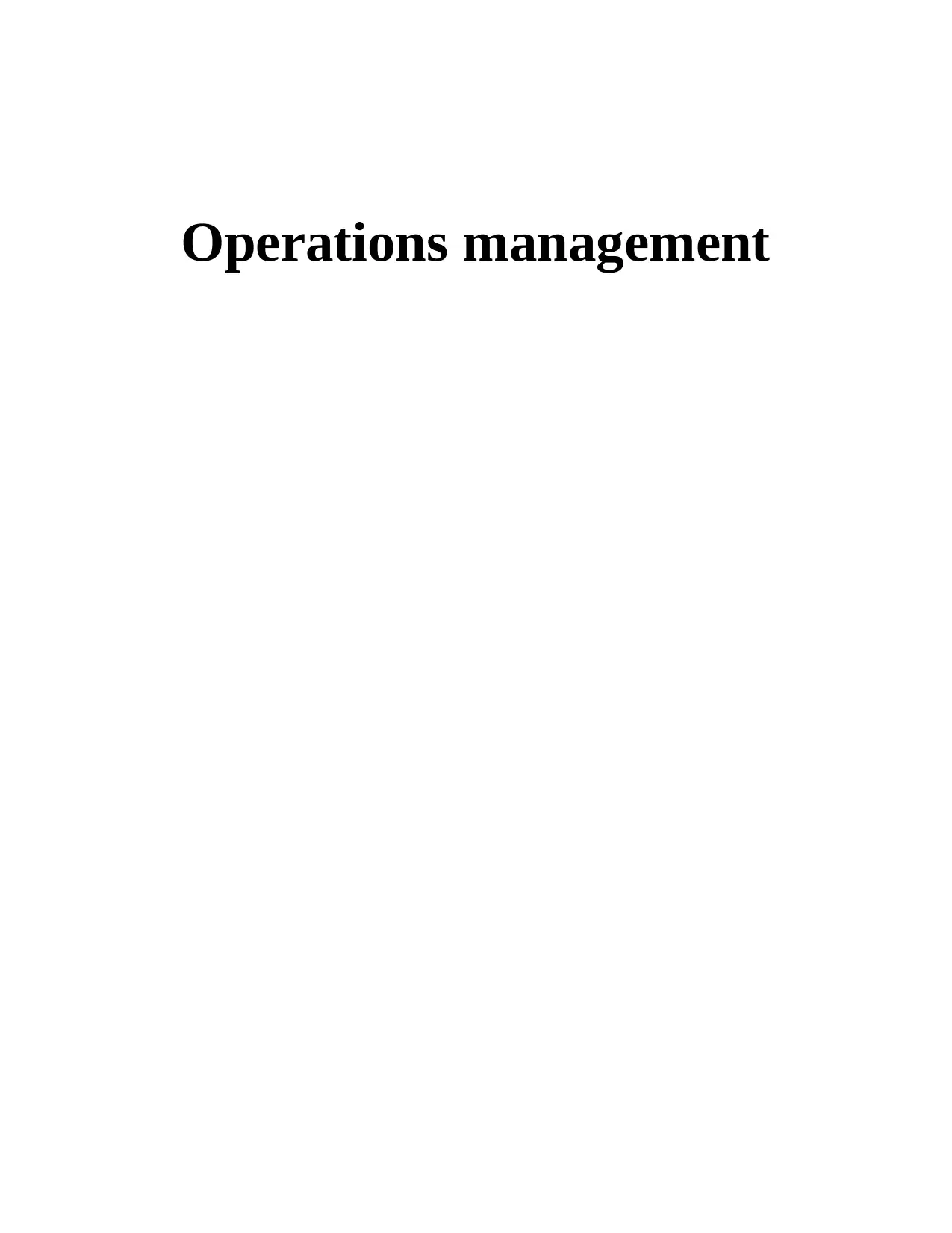
Operations management
Paraphrase This Document
Need a fresh take? Get an instant paraphrase of this document with our AI Paraphraser
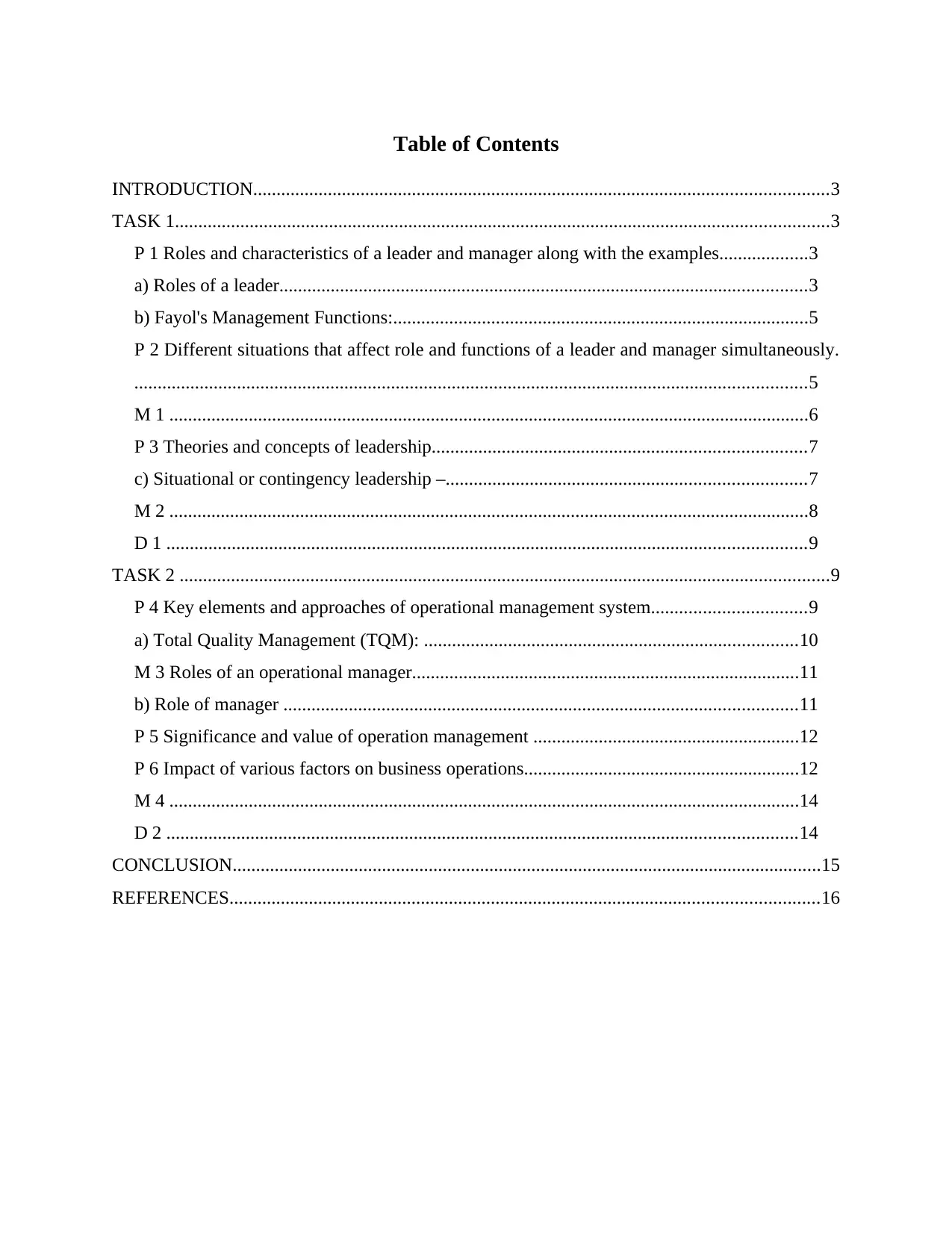
Table of Contents
INTRODUCTION...........................................................................................................................3
TASK 1............................................................................................................................................3
P 1 Roles and characteristics of a leader and manager along with the examples...................3
a) Roles of a leader.................................................................................................................3
b) Fayol's Management Functions:.........................................................................................5
P 2 Different situations that affect role and functions of a leader and manager simultaneously.
................................................................................................................................................5
M 1 .........................................................................................................................................6
P 3 Theories and concepts of leadership................................................................................7
c) Situational or contingency leadership –.............................................................................7
M 2 .........................................................................................................................................8
D 1 .........................................................................................................................................9
TASK 2 ...........................................................................................................................................9
P 4 Key elements and approaches of operational management system.................................9
a) Total Quality Management (TQM): ................................................................................10
M 3 Roles of an operational manager...................................................................................11
b) Role of manager ..............................................................................................................11
P 5 Significance and value of operation management .........................................................12
P 6 Impact of various factors on business operations...........................................................12
M 4 .......................................................................................................................................14
D 2 .......................................................................................................................................14
CONCLUSION..............................................................................................................................15
REFERENCES..............................................................................................................................16
INTRODUCTION...........................................................................................................................3
TASK 1............................................................................................................................................3
P 1 Roles and characteristics of a leader and manager along with the examples...................3
a) Roles of a leader.................................................................................................................3
b) Fayol's Management Functions:.........................................................................................5
P 2 Different situations that affect role and functions of a leader and manager simultaneously.
................................................................................................................................................5
M 1 .........................................................................................................................................6
P 3 Theories and concepts of leadership................................................................................7
c) Situational or contingency leadership –.............................................................................7
M 2 .........................................................................................................................................8
D 1 .........................................................................................................................................9
TASK 2 ...........................................................................................................................................9
P 4 Key elements and approaches of operational management system.................................9
a) Total Quality Management (TQM): ................................................................................10
M 3 Roles of an operational manager...................................................................................11
b) Role of manager ..............................................................................................................11
P 5 Significance and value of operation management .........................................................12
P 6 Impact of various factors on business operations...........................................................12
M 4 .......................................................................................................................................14
D 2 .......................................................................................................................................14
CONCLUSION..............................................................................................................................15
REFERENCES..............................................................................................................................16
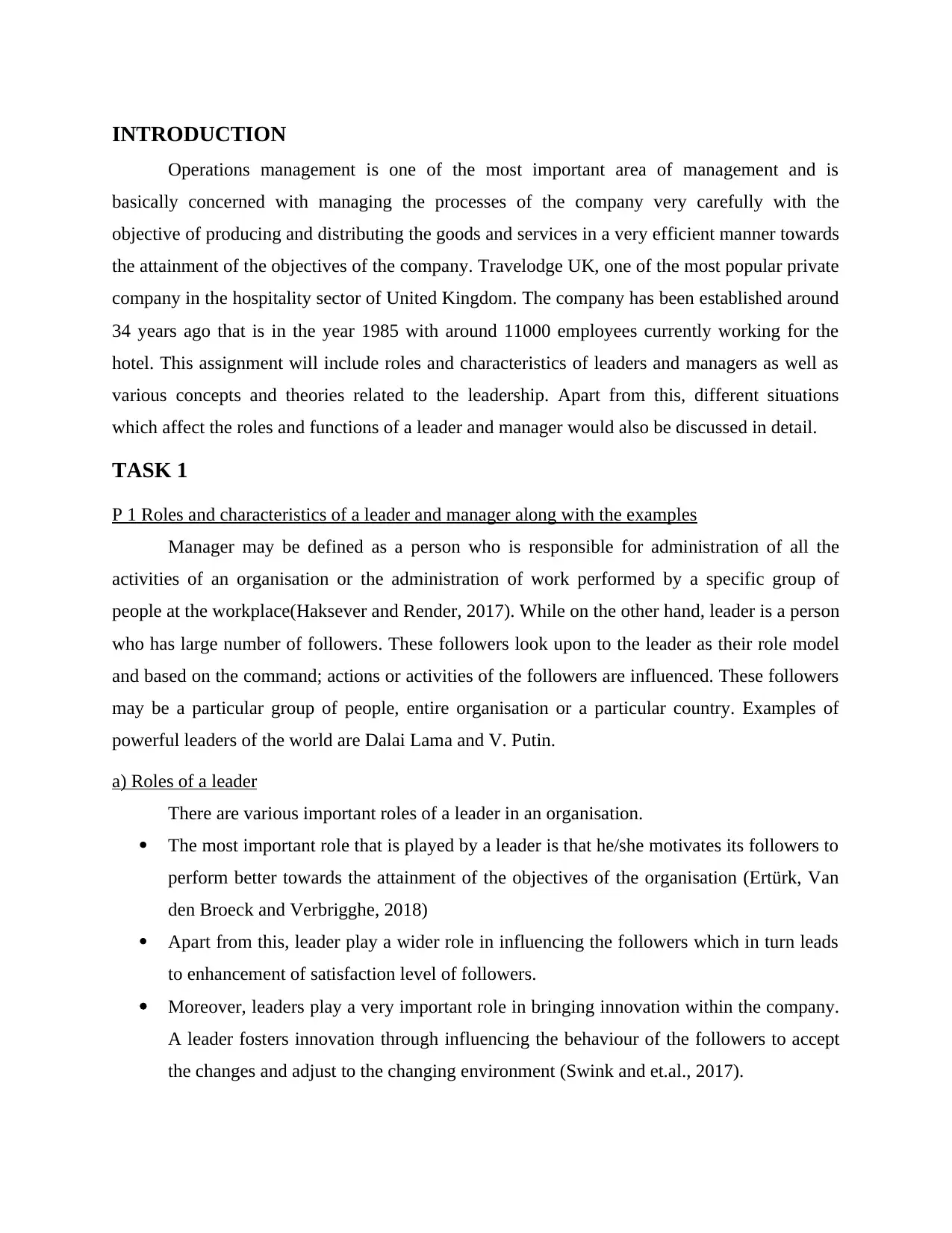
INTRODUCTION
Operations management is one of the most important area of management and is
basically concerned with managing the processes of the company very carefully with the
objective of producing and distributing the goods and services in a very efficient manner towards
the attainment of the objectives of the company. Travelodge UK, one of the most popular private
company in the hospitality sector of United Kingdom. The company has been established around
34 years ago that is in the year 1985 with around 11000 employees currently working for the
hotel. This assignment will include roles and characteristics of leaders and managers as well as
various concepts and theories related to the leadership. Apart from this, different situations
which affect the roles and functions of a leader and manager would also be discussed in detail.
TASK 1
P 1 Roles and characteristics of a leader and manager along with the examples
Manager may be defined as a person who is responsible for administration of all the
activities of an organisation or the administration of work performed by a specific group of
people at the workplace(Haksever and Render, 2017). While on the other hand, leader is a person
who has large number of followers. These followers look upon to the leader as their role model
and based on the command; actions or activities of the followers are influenced. These followers
may be a particular group of people, entire organisation or a particular country. Examples of
powerful leaders of the world are Dalai Lama and V. Putin.
a) Roles of a leader
There are various important roles of a leader in an organisation.
The most important role that is played by a leader is that he/she motivates its followers to
perform better towards the attainment of the objectives of the organisation (Ertürk, Van
den Broeck and Verbrigghe, 2018)
Apart from this, leader play a wider role in influencing the followers which in turn leads
to enhancement of satisfaction level of followers.
Moreover, leaders play a very important role in bringing innovation within the company.
A leader fosters innovation through influencing the behaviour of the followers to accept
the changes and adjust to the changing environment (Swink and et.al., 2017).
Operations management is one of the most important area of management and is
basically concerned with managing the processes of the company very carefully with the
objective of producing and distributing the goods and services in a very efficient manner towards
the attainment of the objectives of the company. Travelodge UK, one of the most popular private
company in the hospitality sector of United Kingdom. The company has been established around
34 years ago that is in the year 1985 with around 11000 employees currently working for the
hotel. This assignment will include roles and characteristics of leaders and managers as well as
various concepts and theories related to the leadership. Apart from this, different situations
which affect the roles and functions of a leader and manager would also be discussed in detail.
TASK 1
P 1 Roles and characteristics of a leader and manager along with the examples
Manager may be defined as a person who is responsible for administration of all the
activities of an organisation or the administration of work performed by a specific group of
people at the workplace(Haksever and Render, 2017). While on the other hand, leader is a person
who has large number of followers. These followers look upon to the leader as their role model
and based on the command; actions or activities of the followers are influenced. These followers
may be a particular group of people, entire organisation or a particular country. Examples of
powerful leaders of the world are Dalai Lama and V. Putin.
a) Roles of a leader
There are various important roles of a leader in an organisation.
The most important role that is played by a leader is that he/she motivates its followers to
perform better towards the attainment of the objectives of the organisation (Ertürk, Van
den Broeck and Verbrigghe, 2018)
Apart from this, leader play a wider role in influencing the followers which in turn leads
to enhancement of satisfaction level of followers.
Moreover, leaders play a very important role in bringing innovation within the company.
A leader fosters innovation through influencing the behaviour of the followers to accept
the changes and adjust to the changing environment (Swink and et.al., 2017).
⊘ This is a preview!⊘
Do you want full access?
Subscribe today to unlock all pages.

Trusted by 1+ million students worldwide
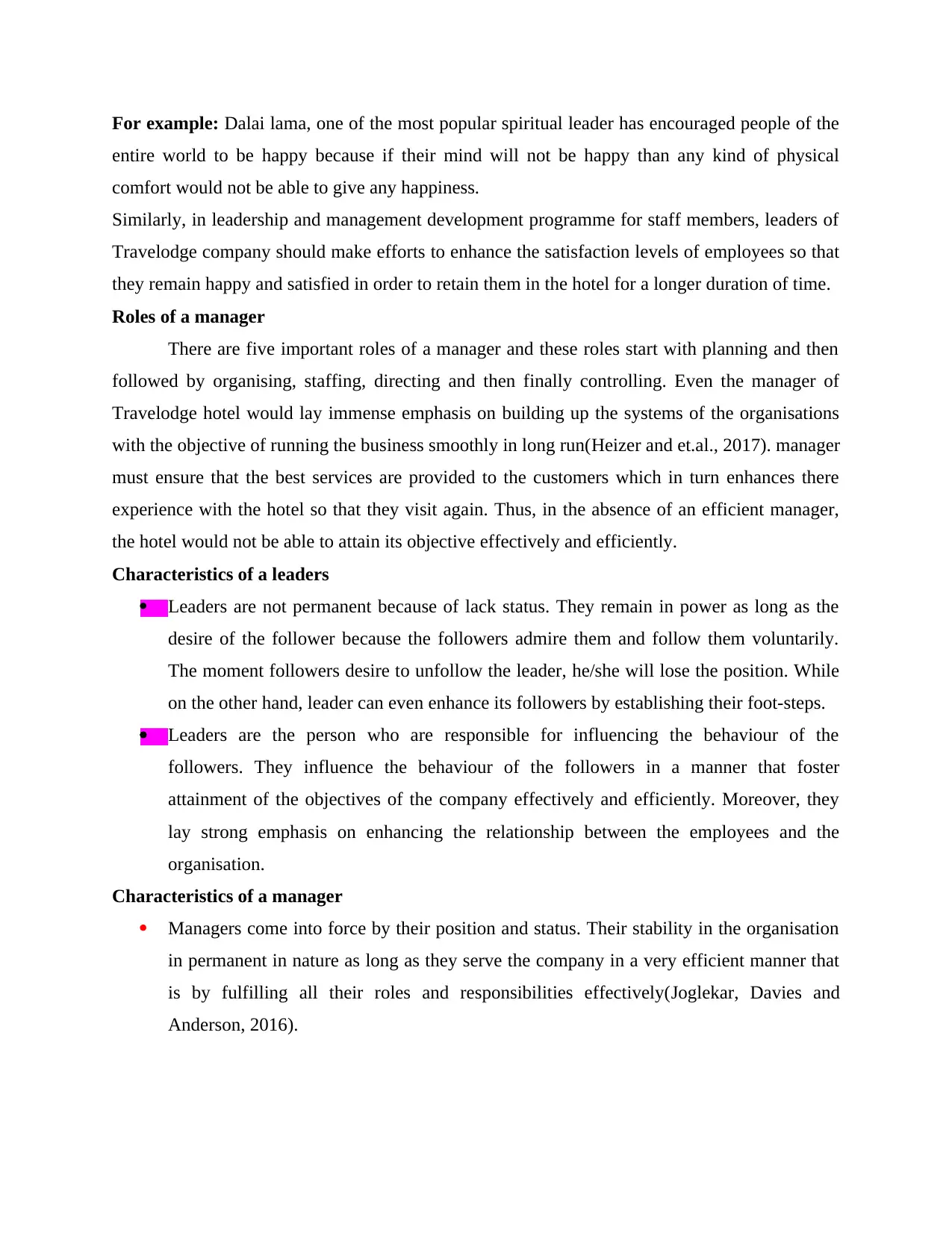
For example: Dalai lama, one of the most popular spiritual leader has encouraged people of the
entire world to be happy because if their mind will not be happy than any kind of physical
comfort would not be able to give any happiness.
Similarly, in leadership and management development programme for staff members, leaders of
Travelodge company should make efforts to enhance the satisfaction levels of employees so that
they remain happy and satisfied in order to retain them in the hotel for a longer duration of time.
Roles of a manager
There are five important roles of a manager and these roles start with planning and then
followed by organising, staffing, directing and then finally controlling. Even the manager of
Travelodge hotel would lay immense emphasis on building up the systems of the organisations
with the objective of running the business smoothly in long run(Heizer and et.al., 2017). manager
must ensure that the best services are provided to the customers which in turn enhances there
experience with the hotel so that they visit again. Thus, in the absence of an efficient manager,
the hotel would not be able to attain its objective effectively and efficiently.
Characteristics of a leaders
Leaders are not permanent because of lack status. They remain in power as long as the
desire of the follower because the followers admire them and follow them voluntarily.
The moment followers desire to unfollow the leader, he/she will lose the position. While
on the other hand, leader can even enhance its followers by establishing their foot-steps.
Leaders are the person who are responsible for influencing the behaviour of the
followers. They influence the behaviour of the followers in a manner that foster
attainment of the objectives of the company effectively and efficiently. Moreover, they
lay strong emphasis on enhancing the relationship between the employees and the
organisation.
Characteristics of a manager
Managers come into force by their position and status. Their stability in the organisation
in permanent in nature as long as they serve the company in a very efficient manner that
is by fulfilling all their roles and responsibilities effectively(Joglekar, Davies and
Anderson, 2016).
entire world to be happy because if their mind will not be happy than any kind of physical
comfort would not be able to give any happiness.
Similarly, in leadership and management development programme for staff members, leaders of
Travelodge company should make efforts to enhance the satisfaction levels of employees so that
they remain happy and satisfied in order to retain them in the hotel for a longer duration of time.
Roles of a manager
There are five important roles of a manager and these roles start with planning and then
followed by organising, staffing, directing and then finally controlling. Even the manager of
Travelodge hotel would lay immense emphasis on building up the systems of the organisations
with the objective of running the business smoothly in long run(Heizer and et.al., 2017). manager
must ensure that the best services are provided to the customers which in turn enhances there
experience with the hotel so that they visit again. Thus, in the absence of an efficient manager,
the hotel would not be able to attain its objective effectively and efficiently.
Characteristics of a leaders
Leaders are not permanent because of lack status. They remain in power as long as the
desire of the follower because the followers admire them and follow them voluntarily.
The moment followers desire to unfollow the leader, he/she will lose the position. While
on the other hand, leader can even enhance its followers by establishing their foot-steps.
Leaders are the person who are responsible for influencing the behaviour of the
followers. They influence the behaviour of the followers in a manner that foster
attainment of the objectives of the company effectively and efficiently. Moreover, they
lay strong emphasis on enhancing the relationship between the employees and the
organisation.
Characteristics of a manager
Managers come into force by their position and status. Their stability in the organisation
in permanent in nature as long as they serve the company in a very efficient manner that
is by fulfilling all their roles and responsibilities effectively(Joglekar, Davies and
Anderson, 2016).
Paraphrase This Document
Need a fresh take? Get an instant paraphrase of this document with our AI Paraphraser
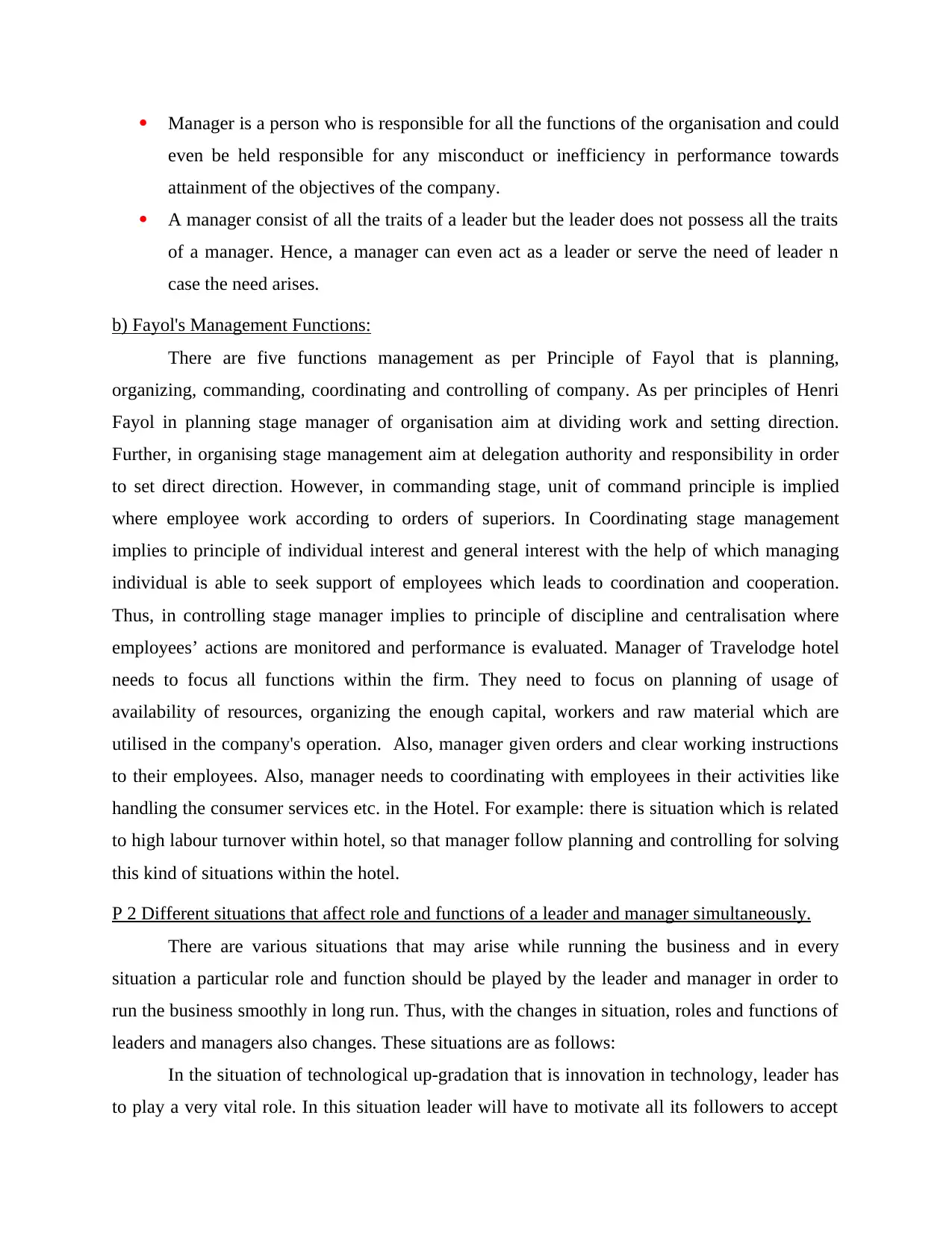
Manager is a person who is responsible for all the functions of the organisation and could
even be held responsible for any misconduct or inefficiency in performance towards
attainment of the objectives of the company.
A manager consist of all the traits of a leader but the leader does not possess all the traits
of a manager. Hence, a manager can even act as a leader or serve the need of leader n
case the need arises.
b) Fayol's Management Functions:
There are five functions management as per Principle of Fayol that is planning,
organizing, commanding, coordinating and controlling of company. As per principles of Henri
Fayol in planning stage manager of organisation aim at dividing work and setting direction.
Further, in organising stage management aim at delegation authority and responsibility in order
to set direct direction. However, in commanding stage, unit of command principle is implied
where employee work according to orders of superiors. In Coordinating stage management
implies to principle of individual interest and general interest with the help of which managing
individual is able to seek support of employees which leads to coordination and cooperation.
Thus, in controlling stage manager implies to principle of discipline and centralisation where
employees’ actions are monitored and performance is evaluated. Manager of Travelodge hotel
needs to focus all functions within the firm. They need to focus on planning of usage of
availability of resources, organizing the enough capital, workers and raw material which are
utilised in the company's operation. Also, manager given orders and clear working instructions
to their employees. Also, manager needs to coordinating with employees in their activities like
handling the consumer services etc. in the Hotel. For example: there is situation which is related
to high labour turnover within hotel, so that manager follow planning and controlling for solving
this kind of situations within the hotel.
P 2 Different situations that affect role and functions of a leader and manager simultaneously.
There are various situations that may arise while running the business and in every
situation a particular role and function should be played by the leader and manager in order to
run the business smoothly in long run. Thus, with the changes in situation, roles and functions of
leaders and managers also changes. These situations are as follows:
In the situation of technological up-gradation that is innovation in technology, leader has
to play a very vital role. In this situation leader will have to motivate all its followers to accept
even be held responsible for any misconduct or inefficiency in performance towards
attainment of the objectives of the company.
A manager consist of all the traits of a leader but the leader does not possess all the traits
of a manager. Hence, a manager can even act as a leader or serve the need of leader n
case the need arises.
b) Fayol's Management Functions:
There are five functions management as per Principle of Fayol that is planning,
organizing, commanding, coordinating and controlling of company. As per principles of Henri
Fayol in planning stage manager of organisation aim at dividing work and setting direction.
Further, in organising stage management aim at delegation authority and responsibility in order
to set direct direction. However, in commanding stage, unit of command principle is implied
where employee work according to orders of superiors. In Coordinating stage management
implies to principle of individual interest and general interest with the help of which managing
individual is able to seek support of employees which leads to coordination and cooperation.
Thus, in controlling stage manager implies to principle of discipline and centralisation where
employees’ actions are monitored and performance is evaluated. Manager of Travelodge hotel
needs to focus all functions within the firm. They need to focus on planning of usage of
availability of resources, organizing the enough capital, workers and raw material which are
utilised in the company's operation. Also, manager given orders and clear working instructions
to their employees. Also, manager needs to coordinating with employees in their activities like
handling the consumer services etc. in the Hotel. For example: there is situation which is related
to high labour turnover within hotel, so that manager follow planning and controlling for solving
this kind of situations within the hotel.
P 2 Different situations that affect role and functions of a leader and manager simultaneously.
There are various situations that may arise while running the business and in every
situation a particular role and function should be played by the leader and manager in order to
run the business smoothly in long run. Thus, with the changes in situation, roles and functions of
leaders and managers also changes. These situations are as follows:
In the situation of technological up-gradation that is innovation in technology, leader has
to play a very vital role. In this situation leader will have to motivate all its followers to accept
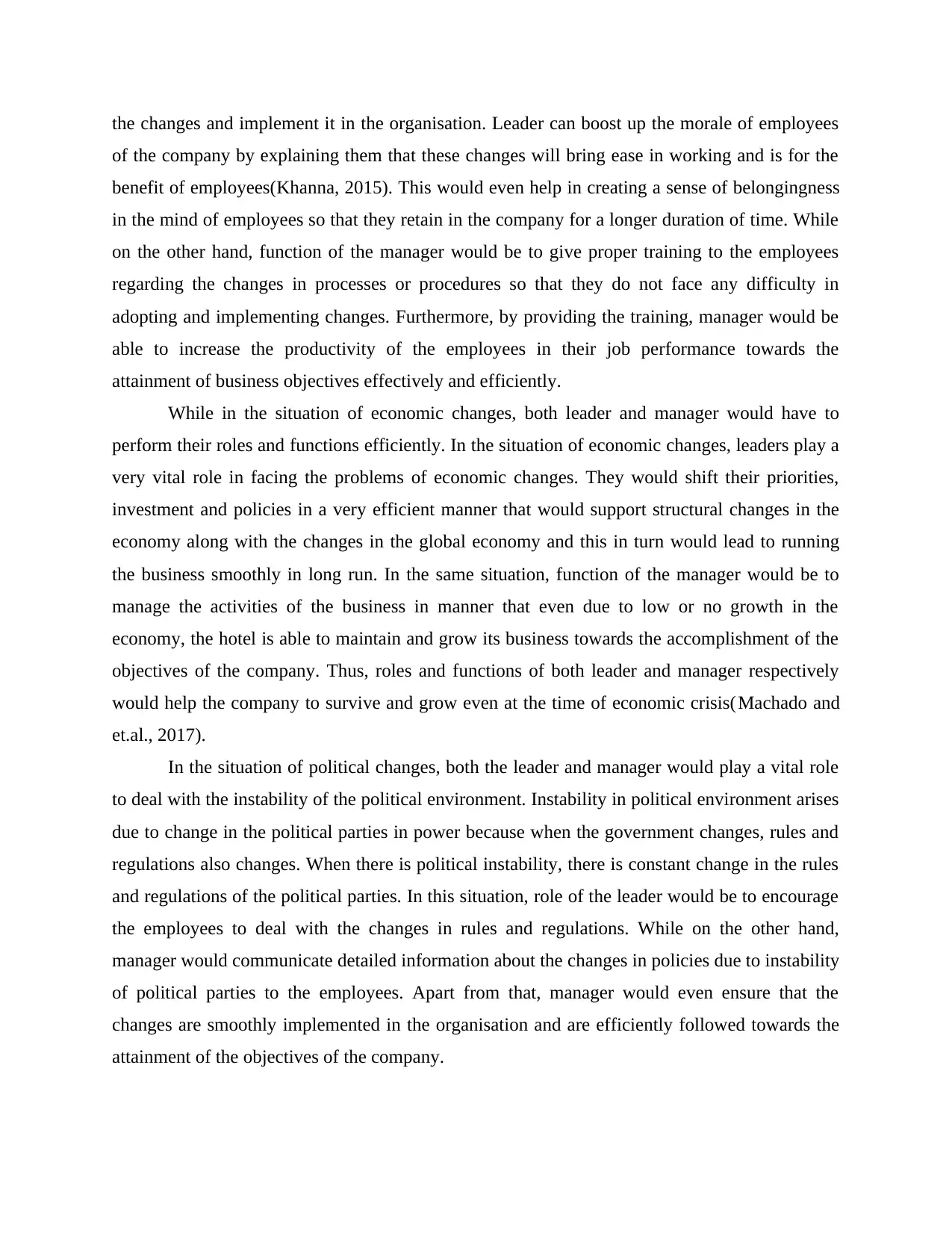
the changes and implement it in the organisation. Leader can boost up the morale of employees
of the company by explaining them that these changes will bring ease in working and is for the
benefit of employees(Khanna, 2015). This would even help in creating a sense of belongingness
in the mind of employees so that they retain in the company for a longer duration of time. While
on the other hand, function of the manager would be to give proper training to the employees
regarding the changes in processes or procedures so that they do not face any difficulty in
adopting and implementing changes. Furthermore, by providing the training, manager would be
able to increase the productivity of the employees in their job performance towards the
attainment of business objectives effectively and efficiently.
While in the situation of economic changes, both leader and manager would have to
perform their roles and functions efficiently. In the situation of economic changes, leaders play a
very vital role in facing the problems of economic changes. They would shift their priorities,
investment and policies in a very efficient manner that would support structural changes in the
economy along with the changes in the global economy and this in turn would lead to running
the business smoothly in long run. In the same situation, function of the manager would be to
manage the activities of the business in manner that even due to low or no growth in the
economy, the hotel is able to maintain and grow its business towards the accomplishment of the
objectives of the company. Thus, roles and functions of both leader and manager respectively
would help the company to survive and grow even at the time of economic crisis(Machado and
et.al., 2017).
In the situation of political changes, both the leader and manager would play a vital role
to deal with the instability of the political environment. Instability in political environment arises
due to change in the political parties in power because when the government changes, rules and
regulations also changes. When there is political instability, there is constant change in the rules
and regulations of the political parties. In this situation, role of the leader would be to encourage
the employees to deal with the changes in rules and regulations. While on the other hand,
manager would communicate detailed information about the changes in policies due to instability
of political parties to the employees. Apart from that, manager would even ensure that the
changes are smoothly implemented in the organisation and are efficiently followed towards the
attainment of the objectives of the company.
of the company by explaining them that these changes will bring ease in working and is for the
benefit of employees(Khanna, 2015). This would even help in creating a sense of belongingness
in the mind of employees so that they retain in the company for a longer duration of time. While
on the other hand, function of the manager would be to give proper training to the employees
regarding the changes in processes or procedures so that they do not face any difficulty in
adopting and implementing changes. Furthermore, by providing the training, manager would be
able to increase the productivity of the employees in their job performance towards the
attainment of business objectives effectively and efficiently.
While in the situation of economic changes, both leader and manager would have to
perform their roles and functions efficiently. In the situation of economic changes, leaders play a
very vital role in facing the problems of economic changes. They would shift their priorities,
investment and policies in a very efficient manner that would support structural changes in the
economy along with the changes in the global economy and this in turn would lead to running
the business smoothly in long run. In the same situation, function of the manager would be to
manage the activities of the business in manner that even due to low or no growth in the
economy, the hotel is able to maintain and grow its business towards the accomplishment of the
objectives of the company. Thus, roles and functions of both leader and manager respectively
would help the company to survive and grow even at the time of economic crisis(Machado and
et.al., 2017).
In the situation of political changes, both the leader and manager would play a vital role
to deal with the instability of the political environment. Instability in political environment arises
due to change in the political parties in power because when the government changes, rules and
regulations also changes. When there is political instability, there is constant change in the rules
and regulations of the political parties. In this situation, role of the leader would be to encourage
the employees to deal with the changes in rules and regulations. While on the other hand,
manager would communicate detailed information about the changes in policies due to instability
of political parties to the employees. Apart from that, manager would even ensure that the
changes are smoothly implemented in the organisation and are efficiently followed towards the
attainment of the objectives of the company.
⊘ This is a preview!⊘
Do you want full access?
Subscribe today to unlock all pages.

Trusted by 1+ million students worldwide
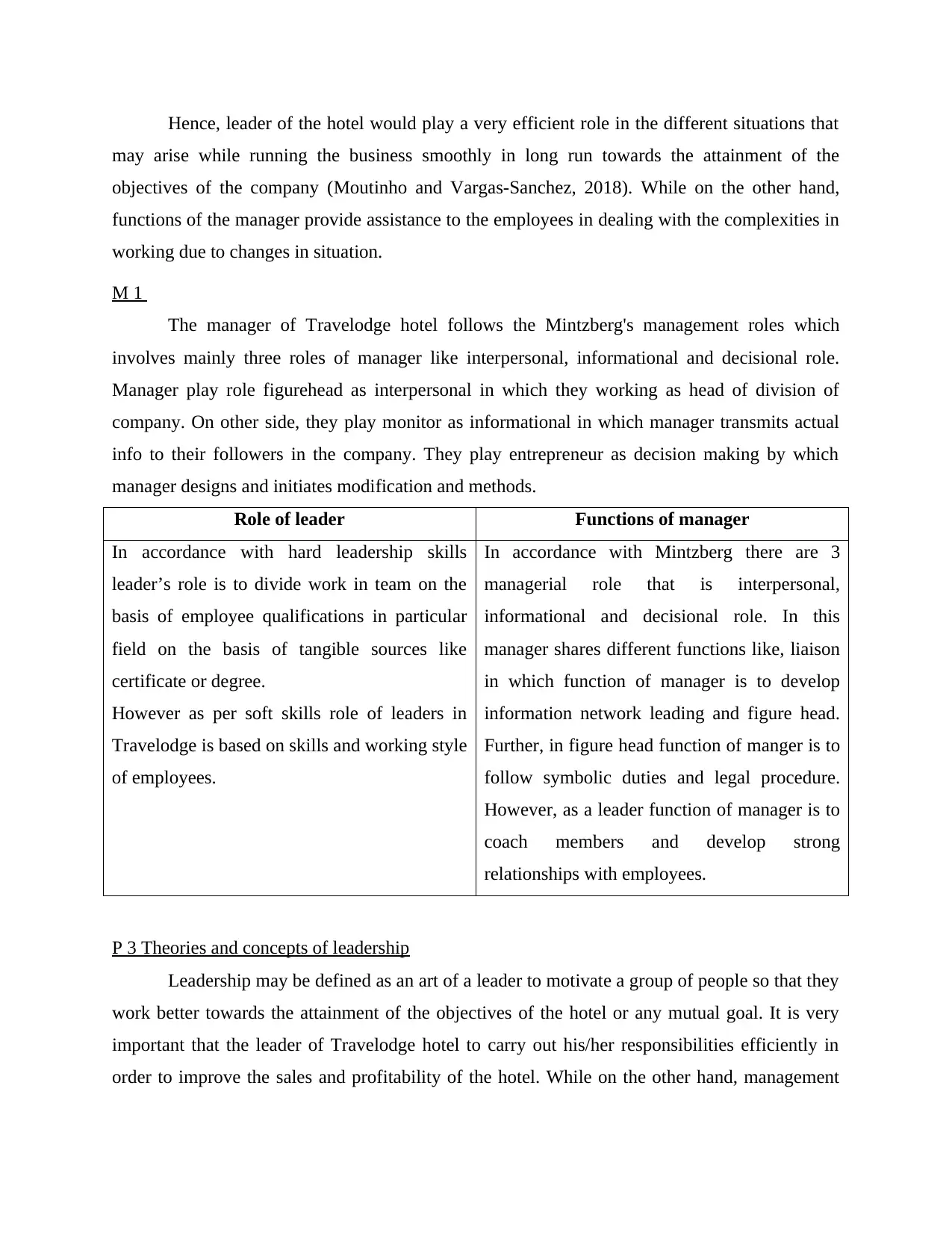
Hence, leader of the hotel would play a very efficient role in the different situations that
may arise while running the business smoothly in long run towards the attainment of the
objectives of the company (Moutinho and Vargas-Sanchez, 2018). While on the other hand,
functions of the manager provide assistance to the employees in dealing with the complexities in
working due to changes in situation.
M 1
The manager of Travelodge hotel follows the Mintzberg's management roles which
involves mainly three roles of manager like interpersonal, informational and decisional role.
Manager play role figurehead as interpersonal in which they working as head of division of
company. On other side, they play monitor as informational in which manager transmits actual
info to their followers in the company. They play entrepreneur as decision making by which
manager designs and initiates modification and methods.
Role of leader Functions of manager
In accordance with hard leadership skills
leader’s role is to divide work in team on the
basis of employee qualifications in particular
field on the basis of tangible sources like
certificate or degree.
However as per soft skills role of leaders in
Travelodge is based on skills and working style
of employees.
In accordance with Mintzberg there are 3
managerial role that is interpersonal,
informational and decisional role. In this
manager shares different functions like, liaison
in which function of manager is to develop
information network leading and figure head.
Further, in figure head function of manger is to
follow symbolic duties and legal procedure.
However, as a leader function of manager is to
coach members and develop strong
relationships with employees.
P 3 Theories and concepts of leadership
Leadership may be defined as an art of a leader to motivate a group of people so that they
work better towards the attainment of the objectives of the hotel or any mutual goal. It is very
important that the leader of Travelodge hotel to carry out his/her responsibilities efficiently in
order to improve the sales and profitability of the hotel. While on the other hand, management
may arise while running the business smoothly in long run towards the attainment of the
objectives of the company (Moutinho and Vargas-Sanchez, 2018). While on the other hand,
functions of the manager provide assistance to the employees in dealing with the complexities in
working due to changes in situation.
M 1
The manager of Travelodge hotel follows the Mintzberg's management roles which
involves mainly three roles of manager like interpersonal, informational and decisional role.
Manager play role figurehead as interpersonal in which they working as head of division of
company. On other side, they play monitor as informational in which manager transmits actual
info to their followers in the company. They play entrepreneur as decision making by which
manager designs and initiates modification and methods.
Role of leader Functions of manager
In accordance with hard leadership skills
leader’s role is to divide work in team on the
basis of employee qualifications in particular
field on the basis of tangible sources like
certificate or degree.
However as per soft skills role of leaders in
Travelodge is based on skills and working style
of employees.
In accordance with Mintzberg there are 3
managerial role that is interpersonal,
informational and decisional role. In this
manager shares different functions like, liaison
in which function of manager is to develop
information network leading and figure head.
Further, in figure head function of manger is to
follow symbolic duties and legal procedure.
However, as a leader function of manager is to
coach members and develop strong
relationships with employees.
P 3 Theories and concepts of leadership
Leadership may be defined as an art of a leader to motivate a group of people so that they
work better towards the attainment of the objectives of the hotel or any mutual goal. It is very
important that the leader of Travelodge hotel to carry out his/her responsibilities efficiently in
order to improve the sales and profitability of the hotel. While on the other hand, management
Paraphrase This Document
Need a fresh take? Get an instant paraphrase of this document with our AI Paraphraser
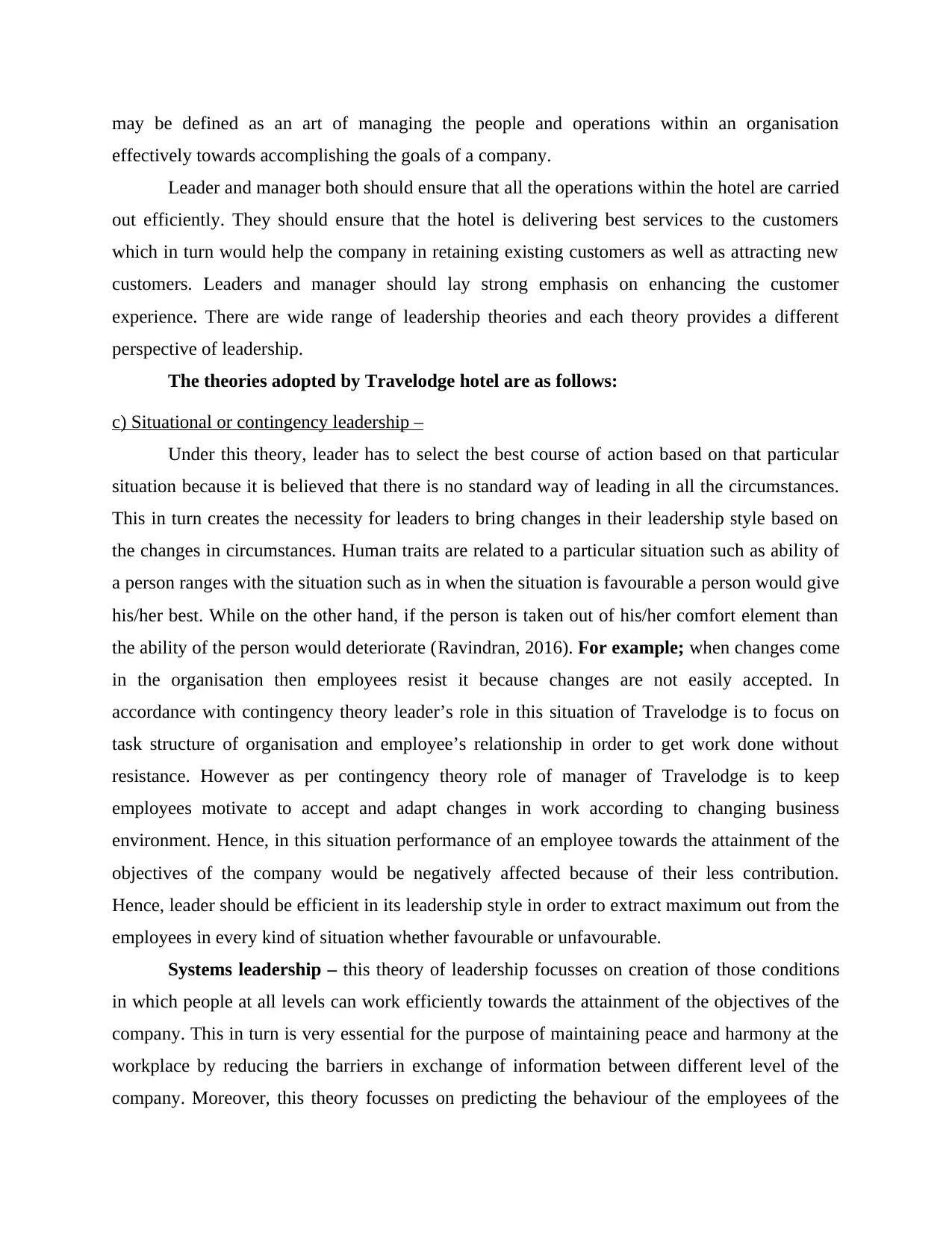
may be defined as an art of managing the people and operations within an organisation
effectively towards accomplishing the goals of a company.
Leader and manager both should ensure that all the operations within the hotel are carried
out efficiently. They should ensure that the hotel is delivering best services to the customers
which in turn would help the company in retaining existing customers as well as attracting new
customers. Leaders and manager should lay strong emphasis on enhancing the customer
experience. There are wide range of leadership theories and each theory provides a different
perspective of leadership.
The theories adopted by Travelodge hotel are as follows:
c) Situational or contingency leadership –
Under this theory, leader has to select the best course of action based on that particular
situation because it is believed that there is no standard way of leading in all the circumstances.
This in turn creates the necessity for leaders to bring changes in their leadership style based on
the changes in circumstances. Human traits are related to a particular situation such as ability of
a person ranges with the situation such as in when the situation is favourable a person would give
his/her best. While on the other hand, if the person is taken out of his/her comfort element than
the ability of the person would deteriorate (Ravindran, 2016). For example; when changes come
in the organisation then employees resist it because changes are not easily accepted. In
accordance with contingency theory leader’s role in this situation of Travelodge is to focus on
task structure of organisation and employee’s relationship in order to get work done without
resistance. However as per contingency theory role of manager of Travelodge is to keep
employees motivate to accept and adapt changes in work according to changing business
environment. Hence, in this situation performance of an employee towards the attainment of the
objectives of the company would be negatively affected because of their less contribution.
Hence, leader should be efficient in its leadership style in order to extract maximum out from the
employees in every kind of situation whether favourable or unfavourable.
Systems leadership – this theory of leadership focusses on creation of those conditions
in which people at all levels can work efficiently towards the attainment of the objectives of the
company. This in turn is very essential for the purpose of maintaining peace and harmony at the
workplace by reducing the barriers in exchange of information between different level of the
company. Moreover, this theory focusses on predicting the behaviour of the employees of the
effectively towards accomplishing the goals of a company.
Leader and manager both should ensure that all the operations within the hotel are carried
out efficiently. They should ensure that the hotel is delivering best services to the customers
which in turn would help the company in retaining existing customers as well as attracting new
customers. Leaders and manager should lay strong emphasis on enhancing the customer
experience. There are wide range of leadership theories and each theory provides a different
perspective of leadership.
The theories adopted by Travelodge hotel are as follows:
c) Situational or contingency leadership –
Under this theory, leader has to select the best course of action based on that particular
situation because it is believed that there is no standard way of leading in all the circumstances.
This in turn creates the necessity for leaders to bring changes in their leadership style based on
the changes in circumstances. Human traits are related to a particular situation such as ability of
a person ranges with the situation such as in when the situation is favourable a person would give
his/her best. While on the other hand, if the person is taken out of his/her comfort element than
the ability of the person would deteriorate (Ravindran, 2016). For example; when changes come
in the organisation then employees resist it because changes are not easily accepted. In
accordance with contingency theory leader’s role in this situation of Travelodge is to focus on
task structure of organisation and employee’s relationship in order to get work done without
resistance. However as per contingency theory role of manager of Travelodge is to keep
employees motivate to accept and adapt changes in work according to changing business
environment. Hence, in this situation performance of an employee towards the attainment of the
objectives of the company would be negatively affected because of their less contribution.
Hence, leader should be efficient in its leadership style in order to extract maximum out from the
employees in every kind of situation whether favourable or unfavourable.
Systems leadership – this theory of leadership focusses on creation of those conditions
in which people at all levels can work efficiently towards the attainment of the objectives of the
company. This in turn is very essential for the purpose of maintaining peace and harmony at the
workplace by reducing the barriers in exchange of information between different level of the
company. Moreover, this theory focusses on predicting the behaviour of the employees of the
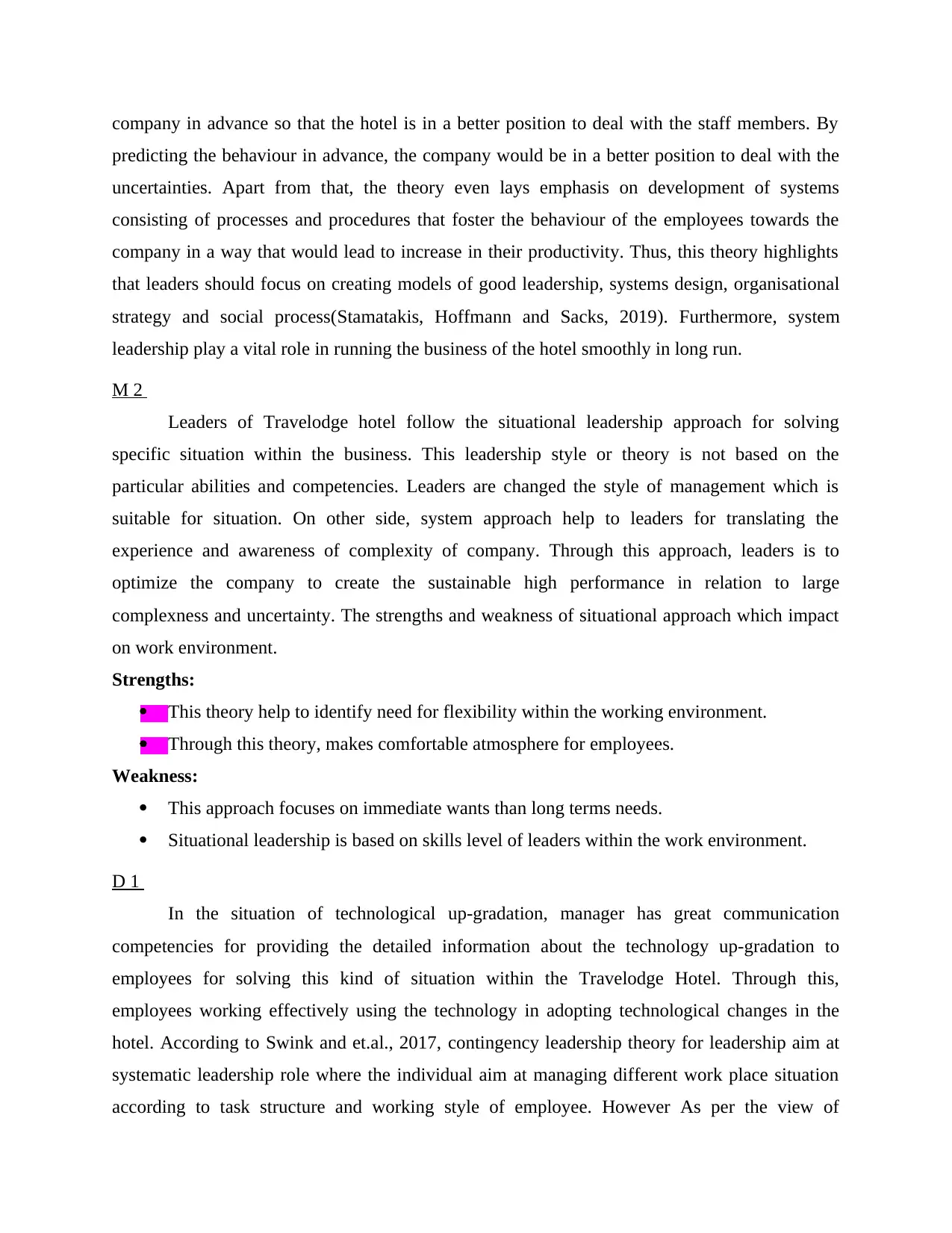
company in advance so that the hotel is in a better position to deal with the staff members. By
predicting the behaviour in advance, the company would be in a better position to deal with the
uncertainties. Apart from that, the theory even lays emphasis on development of systems
consisting of processes and procedures that foster the behaviour of the employees towards the
company in a way that would lead to increase in their productivity. Thus, this theory highlights
that leaders should focus on creating models of good leadership, systems design, organisational
strategy and social process(Stamatakis, Hoffmann and Sacks, 2019). Furthermore, system
leadership play a vital role in running the business of the hotel smoothly in long run.
M 2
Leaders of Travelodge hotel follow the situational leadership approach for solving
specific situation within the business. This leadership style or theory is not based on the
particular abilities and competencies. Leaders are changed the style of management which is
suitable for situation. On other side, system approach help to leaders for translating the
experience and awareness of complexity of company. Through this approach, leaders is to
optimize the company to create the sustainable high performance in relation to large
complexness and uncertainty. The strengths and weakness of situational approach which impact
on work environment.
Strengths:
This theory help to identify need for flexibility within the working environment.
Through this theory, makes comfortable atmosphere for employees.
Weakness:
This approach focuses on immediate wants than long terms needs.
Situational leadership is based on skills level of leaders within the work environment.
D 1
In the situation of technological up-gradation, manager has great communication
competencies for providing the detailed information about the technology up-gradation to
employees for solving this kind of situation within the Travelodge Hotel. Through this,
employees working effectively using the technology in adopting technological changes in the
hotel. According to Swink and et.al., 2017, contingency leadership theory for leadership aim at
systematic leadership role where the individual aim at managing different work place situation
according to task structure and working style of employee. However As per the view of
predicting the behaviour in advance, the company would be in a better position to deal with the
uncertainties. Apart from that, the theory even lays emphasis on development of systems
consisting of processes and procedures that foster the behaviour of the employees towards the
company in a way that would lead to increase in their productivity. Thus, this theory highlights
that leaders should focus on creating models of good leadership, systems design, organisational
strategy and social process(Stamatakis, Hoffmann and Sacks, 2019). Furthermore, system
leadership play a vital role in running the business of the hotel smoothly in long run.
M 2
Leaders of Travelodge hotel follow the situational leadership approach for solving
specific situation within the business. This leadership style or theory is not based on the
particular abilities and competencies. Leaders are changed the style of management which is
suitable for situation. On other side, system approach help to leaders for translating the
experience and awareness of complexity of company. Through this approach, leaders is to
optimize the company to create the sustainable high performance in relation to large
complexness and uncertainty. The strengths and weakness of situational approach which impact
on work environment.
Strengths:
This theory help to identify need for flexibility within the working environment.
Through this theory, makes comfortable atmosphere for employees.
Weakness:
This approach focuses on immediate wants than long terms needs.
Situational leadership is based on skills level of leaders within the work environment.
D 1
In the situation of technological up-gradation, manager has great communication
competencies for providing the detailed information about the technology up-gradation to
employees for solving this kind of situation within the Travelodge Hotel. Through this,
employees working effectively using the technology in adopting technological changes in the
hotel. According to Swink and et.al., 2017, contingency leadership theory for leadership aim at
systematic leadership role where the individual aim at managing different work place situation
according to task structure and working style of employee. However As per the view of
⊘ This is a preview!⊘
Do you want full access?
Subscribe today to unlock all pages.

Trusted by 1+ million students worldwide
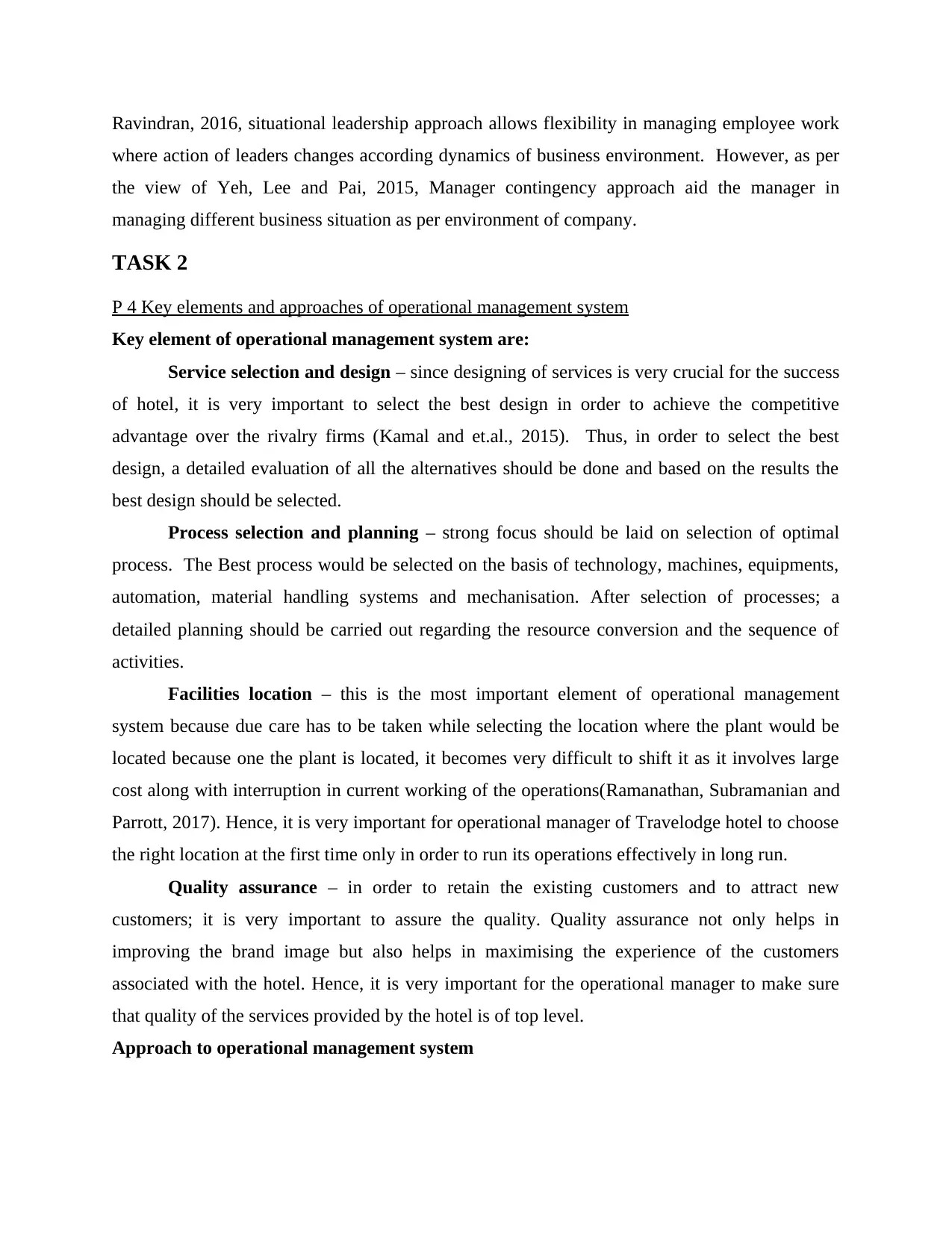
Ravindran, 2016, situational leadership approach allows flexibility in managing employee work
where action of leaders changes according dynamics of business environment. However, as per
the view of Yeh, Lee and Pai, 2015, Manager contingency approach aid the manager in
managing different business situation as per environment of company.
TASK 2
P 4 Key elements and approaches of operational management system
Key element of operational management system are:
Service selection and design – since designing of services is very crucial for the success
of hotel, it is very important to select the best design in order to achieve the competitive
advantage over the rivalry firms (Kamal and et.al., 2015). Thus, in order to select the best
design, a detailed evaluation of all the alternatives should be done and based on the results the
best design should be selected.
Process selection and planning – strong focus should be laid on selection of optimal
process. The Best process would be selected on the basis of technology, machines, equipments,
automation, material handling systems and mechanisation. After selection of processes; a
detailed planning should be carried out regarding the resource conversion and the sequence of
activities.
Facilities location – this is the most important element of operational management
system because due care has to be taken while selecting the location where the plant would be
located because one the plant is located, it becomes very difficult to shift it as it involves large
cost along with interruption in current working of the operations(Ramanathan, Subramanian and
Parrott, 2017). Hence, it is very important for operational manager of Travelodge hotel to choose
the right location at the first time only in order to run its operations effectively in long run.
Quality assurance – in order to retain the existing customers and to attract new
customers; it is very important to assure the quality. Quality assurance not only helps in
improving the brand image but also helps in maximising the experience of the customers
associated with the hotel. Hence, it is very important for the operational manager to make sure
that quality of the services provided by the hotel is of top level.
Approach to operational management system
where action of leaders changes according dynamics of business environment. However, as per
the view of Yeh, Lee and Pai, 2015, Manager contingency approach aid the manager in
managing different business situation as per environment of company.
TASK 2
P 4 Key elements and approaches of operational management system
Key element of operational management system are:
Service selection and design – since designing of services is very crucial for the success
of hotel, it is very important to select the best design in order to achieve the competitive
advantage over the rivalry firms (Kamal and et.al., 2015). Thus, in order to select the best
design, a detailed evaluation of all the alternatives should be done and based on the results the
best design should be selected.
Process selection and planning – strong focus should be laid on selection of optimal
process. The Best process would be selected on the basis of technology, machines, equipments,
automation, material handling systems and mechanisation. After selection of processes; a
detailed planning should be carried out regarding the resource conversion and the sequence of
activities.
Facilities location – this is the most important element of operational management
system because due care has to be taken while selecting the location where the plant would be
located because one the plant is located, it becomes very difficult to shift it as it involves large
cost along with interruption in current working of the operations(Ramanathan, Subramanian and
Parrott, 2017). Hence, it is very important for operational manager of Travelodge hotel to choose
the right location at the first time only in order to run its operations effectively in long run.
Quality assurance – in order to retain the existing customers and to attract new
customers; it is very important to assure the quality. Quality assurance not only helps in
improving the brand image but also helps in maximising the experience of the customers
associated with the hotel. Hence, it is very important for the operational manager to make sure
that quality of the services provided by the hotel is of top level.
Approach to operational management system
Paraphrase This Document
Need a fresh take? Get an instant paraphrase of this document with our AI Paraphraser
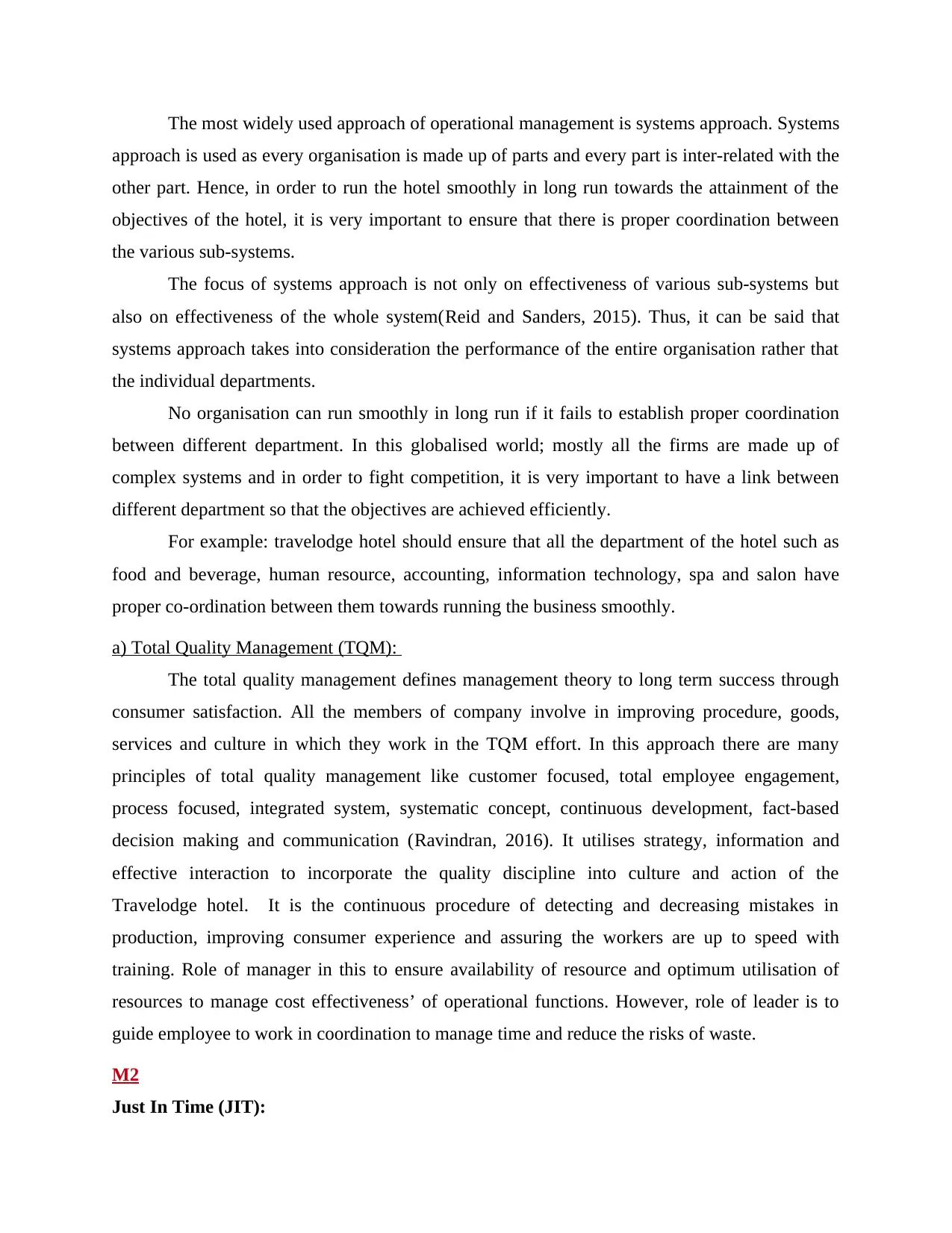
The most widely used approach of operational management is systems approach. Systems
approach is used as every organisation is made up of parts and every part is inter-related with the
other part. Hence, in order to run the hotel smoothly in long run towards the attainment of the
objectives of the hotel, it is very important to ensure that there is proper coordination between
the various sub-systems.
The focus of systems approach is not only on effectiveness of various sub-systems but
also on effectiveness of the whole system(Reid and Sanders, 2015). Thus, it can be said that
systems approach takes into consideration the performance of the entire organisation rather that
the individual departments.
No organisation can run smoothly in long run if it fails to establish proper coordination
between different department. In this globalised world; mostly all the firms are made up of
complex systems and in order to fight competition, it is very important to have a link between
different department so that the objectives are achieved efficiently.
For example: travelodge hotel should ensure that all the department of the hotel such as
food and beverage, human resource, accounting, information technology, spa and salon have
proper co-ordination between them towards running the business smoothly.
a) Total Quality Management (TQM):
The total quality management defines management theory to long term success through
consumer satisfaction. All the members of company involve in improving procedure, goods,
services and culture in which they work in the TQM effort. In this approach there are many
principles of total quality management like customer focused, total employee engagement,
process focused, integrated system, systematic concept, continuous development, fact-based
decision making and communication (Ravindran, 2016). It utilises strategy, information and
effective interaction to incorporate the quality discipline into culture and action of the
Travelodge hotel. It is the continuous procedure of detecting and decreasing mistakes in
production, improving consumer experience and assuring the workers are up to speed with
training. Role of manager in this to ensure availability of resource and optimum utilisation of
resources to manage cost effectiveness’ of operational functions. However, role of leader is to
guide employee to work in coordination to manage time and reduce the risks of waste.
M2
Just In Time (JIT):
approach is used as every organisation is made up of parts and every part is inter-related with the
other part. Hence, in order to run the hotel smoothly in long run towards the attainment of the
objectives of the hotel, it is very important to ensure that there is proper coordination between
the various sub-systems.
The focus of systems approach is not only on effectiveness of various sub-systems but
also on effectiveness of the whole system(Reid and Sanders, 2015). Thus, it can be said that
systems approach takes into consideration the performance of the entire organisation rather that
the individual departments.
No organisation can run smoothly in long run if it fails to establish proper coordination
between different department. In this globalised world; mostly all the firms are made up of
complex systems and in order to fight competition, it is very important to have a link between
different department so that the objectives are achieved efficiently.
For example: travelodge hotel should ensure that all the department of the hotel such as
food and beverage, human resource, accounting, information technology, spa and salon have
proper co-ordination between them towards running the business smoothly.
a) Total Quality Management (TQM):
The total quality management defines management theory to long term success through
consumer satisfaction. All the members of company involve in improving procedure, goods,
services and culture in which they work in the TQM effort. In this approach there are many
principles of total quality management like customer focused, total employee engagement,
process focused, integrated system, systematic concept, continuous development, fact-based
decision making and communication (Ravindran, 2016). It utilises strategy, information and
effective interaction to incorporate the quality discipline into culture and action of the
Travelodge hotel. It is the continuous procedure of detecting and decreasing mistakes in
production, improving consumer experience and assuring the workers are up to speed with
training. Role of manager in this to ensure availability of resource and optimum utilisation of
resources to manage cost effectiveness’ of operational functions. However, role of leader is to
guide employee to work in coordination to manage time and reduce the risks of waste.
M2
Just In Time (JIT):
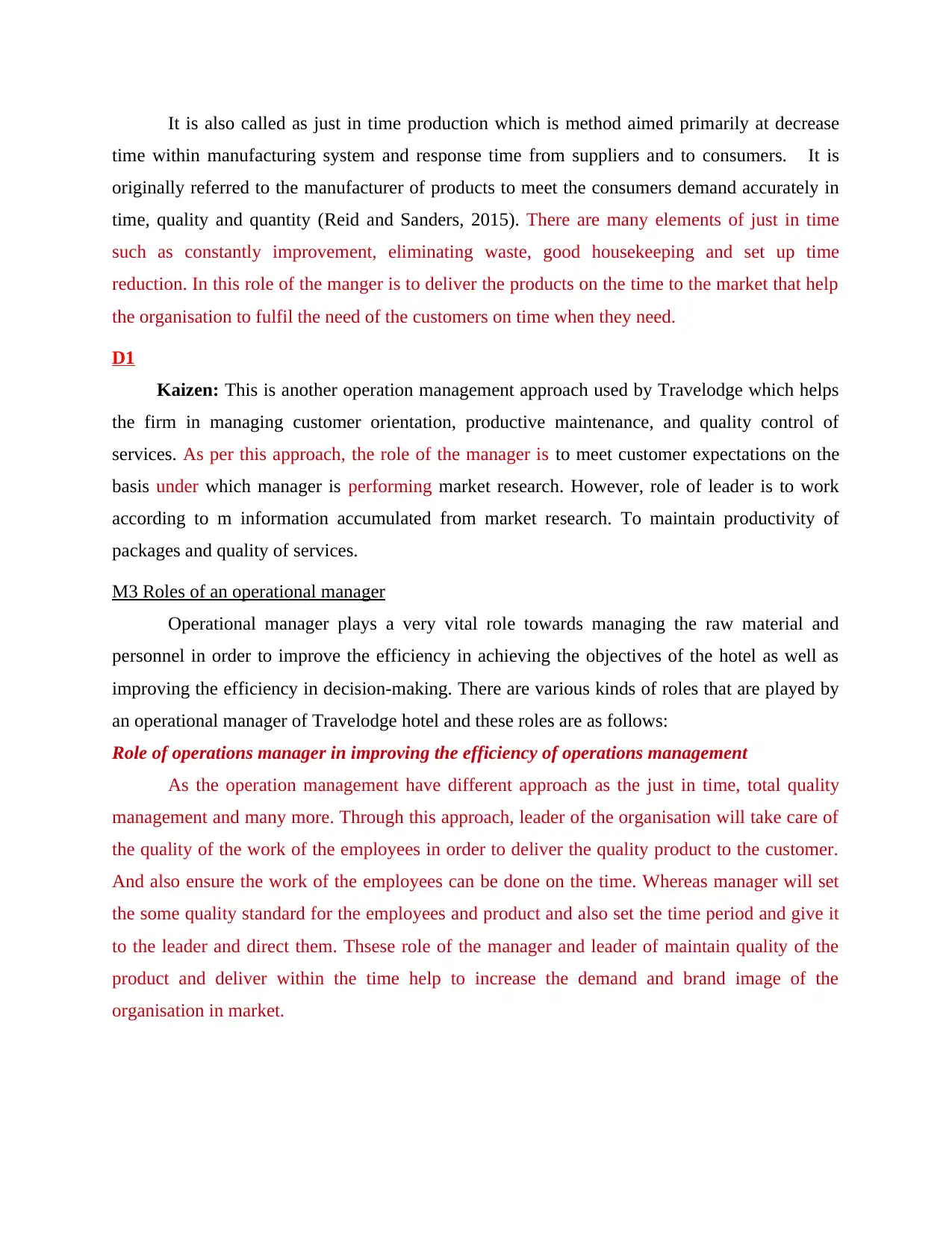
It is also called as just in time production which is method aimed primarily at decrease
time within manufacturing system and response time from suppliers and to consumers. It is
originally referred to the manufacturer of products to meet the consumers demand accurately in
time, quality and quantity (Reid and Sanders, 2015). There are many elements of just in time
such as constantly improvement, eliminating waste, good housekeeping and set up time
reduction. In this role of the manger is to deliver the products on the time to the market that help
the organisation to fulfil the need of the customers on time when they need.
D1
Kaizen: This is another operation management approach used by Travelodge which helps
the firm in managing customer orientation, productive maintenance, and quality control of
services. As per this approach, the role of the manager is to meet customer expectations on the
basis under which manager is performing market research. However, role of leader is to work
according to m information accumulated from market research. To maintain productivity of
packages and quality of services.
M3 Roles of an operational manager
Operational manager plays a very vital role towards managing the raw material and
personnel in order to improve the efficiency in achieving the objectives of the hotel as well as
improving the efficiency in decision-making. There are various kinds of roles that are played by
an operational manager of Travelodge hotel and these roles are as follows:
Role of operations manager in improving the efficiency of operations management
As the operation management have different approach as the just in time, total quality
management and many more. Through this approach, leader of the organisation will take care of
the quality of the work of the employees in order to deliver the quality product to the customer.
And also ensure the work of the employees can be done on the time. Whereas manager will set
the some quality standard for the employees and product and also set the time period and give it
to the leader and direct them. Thsese role of the manager and leader of maintain quality of the
product and deliver within the time help to increase the demand and brand image of the
organisation in market.
time within manufacturing system and response time from suppliers and to consumers. It is
originally referred to the manufacturer of products to meet the consumers demand accurately in
time, quality and quantity (Reid and Sanders, 2015). There are many elements of just in time
such as constantly improvement, eliminating waste, good housekeeping and set up time
reduction. In this role of the manger is to deliver the products on the time to the market that help
the organisation to fulfil the need of the customers on time when they need.
D1
Kaizen: This is another operation management approach used by Travelodge which helps
the firm in managing customer orientation, productive maintenance, and quality control of
services. As per this approach, the role of the manager is to meet customer expectations on the
basis under which manager is performing market research. However, role of leader is to work
according to m information accumulated from market research. To maintain productivity of
packages and quality of services.
M3 Roles of an operational manager
Operational manager plays a very vital role towards managing the raw material and
personnel in order to improve the efficiency in achieving the objectives of the hotel as well as
improving the efficiency in decision-making. There are various kinds of roles that are played by
an operational manager of Travelodge hotel and these roles are as follows:
Role of operations manager in improving the efficiency of operations management
As the operation management have different approach as the just in time, total quality
management and many more. Through this approach, leader of the organisation will take care of
the quality of the work of the employees in order to deliver the quality product to the customer.
And also ensure the work of the employees can be done on the time. Whereas manager will set
the some quality standard for the employees and product and also set the time period and give it
to the leader and direct them. Thsese role of the manager and leader of maintain quality of the
product and deliver within the time help to increase the demand and brand image of the
organisation in market.
⊘ This is a preview!⊘
Do you want full access?
Subscribe today to unlock all pages.

Trusted by 1+ million students worldwide
1 out of 18
Related Documents
Your All-in-One AI-Powered Toolkit for Academic Success.
+13062052269
info@desklib.com
Available 24*7 on WhatsApp / Email
![[object Object]](/_next/static/media/star-bottom.7253800d.svg)
Unlock your academic potential
Copyright © 2020–2026 A2Z Services. All Rights Reserved. Developed and managed by ZUCOL.





